From: 1 John 5:14-21
Prayer for Sinners
[14] And this is the confidence which we have in him, that if we ask anything ac-
cording to his will he hears us. [15] And if we know that he hears us in whatever
we ask, we know that we have obtained the requests made of him. [16] If anyone
sees his brother committing what is not a mortal sin, he will ask, and God will
give him life for those whose sin is not mortal. There is sin which is mortal; I do
not say that one is to pray for that. [17] All wrongdoing is sin, but there is sin
which is not mortal.
The Christian’s Confidence as a Child of God
[18] We know that anyone born of God does not sin, but he who was born of
God keeps him, and the evil one does not touch him.
[19] We know that we are of God, and the whole world is in the power of the evil
one.
[20] And we know that the Son of God has come and has given us understanding,
to know him who is true; and we are in him who is true, in his Son Jesus Christ.
This is the true God and eternal life. [21] Little children, keep yourselves from
idols.
*********************************************************************************************
Commentary:
13-21. St John’s words in v. 13 are evocative of the first epilogue to his Gospel,
where he explains why he wrote that book: “that you may believe that Jesus is
the Christ, the Son of God, and that believing you may have life in his name” (Jn
20:31). In this verse of the letter, the Apostle stresses the efficacy of faith, which
is already an anticipation of eternal life (cf. notes on 1 Jn 3:2; 5:9-12).
His final counsels are designed to strengthen our confidence in prayer and to
urge the need for prayer on behalf of sinners (vv. 14-17); they also stress the con-
viction and confidence that faith in the Son of God gives the believer (vv. 18-21).
14-15. Earlier, the Apostle referred to confidence in prayer and to how we can be
sure of receiving what we pray for: that confidence comes from the fact that “we
keep his commandments and do what pleases him” (1 Jn 3:22). Now he stres-
ses that God always listens to us, if we ask “according to his will”. This condi-
tion can be taken in two ways, as St Bede briefly explains: “Insofar as we ask
for the things he desires, and insofar as those of us who approach him are as he
desires us to be” (”In I Epist. S. Ioannis, ad loc.”). The asker therefore needs to
strive to live in accordance with God’s will, and to identify himself in advance with
God’s plans. If one does not try to live in keeping with God’s commandments,
one cannot expect him to listen to one’s prayers.
When prayer meets those requirements, “we know that we have obtained the re-
quests made of him”, as our Lord himself assured us: “if you ask anything in my
name, I will do it” (Jn 14:14). “It is not surprising, then,” the Cure of Ars teaches,
“that the devil should do everything possible to influence us to give up prayer or
to pray badly, because he knows better than we do how terrible it is for hell and
how impossible it is that God should refuse us what we ask him for in prayer.
How many sinners would get out of sin if they managed to have recourse to pra-
yer!” (”Selected Sermons”, Fifth Sunday after Easter).
16-17. “Mortal sin”: the meaning of the original text is “sin which leads to death”.
The gravity of this sin (St John does not specify its exact nature) recalls the gra-
vity of blasphemy against the Holy Spirit (cf. Mt 12:31-32) and of the sin of apo-
stasy which Hebrews speaks of (Heb 6:4-8).
The Fathers have interpreted this expression in various ways, referring to different
grave sins. In the context of the letter (in the previous chapters St John often
speaks about the antichrists and false prophets who “went out” from the commu-
nity: 2:19) the best interpretation seems to be that of St Bede and St Augustine,
who apply it to the sin of the apostate who, in addition, attacks the faith of other
Christians. “My view is”, St Augustine says, “that the sin unto death is the sin
of the brother who, after knowing God by the grace of our Lord Jesus Christ, at-
tacks brotherly union and in a passion of envy reacts against that very grace by
which he was reconciled to God” (”De Sermo Dom. in monte”, l, 22, 73).
If St John does not expressly command his readers to pray for these sinners,
it does not mean that they are beyond recovery, or that it is useless to pray for
them. Pope St Gelasius I teaches: “There is a sin of death for those who persist
in that same sin; there is a sin not of death for those who desist from sin. There
is, certainly, no sin for the pardon of which the Church does not pray or from
which, by the power which was divinely granted to it, it cannot absolve those
who desist from it” (”Ne forte”).
Referring to this passage of St John, Pope John Paul II says: “Obviously, the
concept of death here is a spiritual death. It is a question of the loss of the true
life or ‘eternal life’, which for John is knowledge of the Father and the Son (cf. Jn
17:3), and communion and intimacy with them. In that passage the sill that leads
to death seems to be the denial of the Son (cf. 1 Jn 2:22), or the worship of false
gods (cf. 1 Jn 5:21). At any rate, by this distinction of concepts John seems to
wish to emphasize the incalculable seriousness of what constitutes the very es-
sence of sin, namely the rejection of God. This is manifested above all in aposta-
sy and idolatry: repudiating faith in revealed truth and, making certain created re-
alities equal to God, raising them to the status of idols”; and false gods (cf. 1 Jn
5:16-21).”
And after referring to blasphemy against the Holy Spirit (cf. Mt 12:31-32) he adds:
“Here of course it is a question of extreme and radical manifestations — rejection
of God, rejection of his grace, and therefore opposition to the very source of salva-
tion (cf. St Thomas, “Summa Theologiae”, II-II, q. 14, a. 1-3) — these are manifes-
tations whereby a person seems to exclude himself voluntarily from the path of
forgiveness. It is to be hoped that very few persist to the end in this attitude of re-
bellion or even defiance of God. Moreover, God in his merciful love is greater than
our hearts, as St John further teaches us (cf. 1 Jn 3:20), and can overcome all
our psychological and spiritual resistance. So that, as St Thomas writes, ‘consi-
dering the omnipotence and mercy of God, no one should despair of the salvation
of anyone in this life’ (”Summa Theologiae, II-II, q. 14, a. 3, ad 1)” (”Reconciliatio
et Paenitentia”, 17).
18-20. “We know”: each of these verses begins this way. He does not mean theo-
retical knowledge but that understanding that comes from living faith. St John is
once again stressing the Christian’s joyful confidence, which he has expounding
throughout the letter (cf. 2:3-6 and note). This confidence is grounded on three ba-
sic truths: 1) he who is born of God does not sin (cf. 1 Jn 3:6-9 and note); 2) “we
are of God”, and therefore we are particularly free of the world, which is still in the
power of the evil one (cf. 4:4; 5:12); 3) the Son of God has become man (cf. 4:2;
5:1). The incarnation of the Word is the central truth which sheds light on the two
previous ones, because our supernatural insight is the effect of the Incarnation (v.
20): Jesus Christ, true God and true man, is also eternal life, for only in him can
we attain that life.
18. “In this Johannine affirmation”, Pope John Paul II teaches, “there is an indica-
tion of hope, based on the divine promises: the Christian has received the guaran-
tee and the necessary strength not to sin. It is not a question therefore of a sin-
lessness acquired through one’s own virtue or even inherent in man, as the Gnos-
tics thought. It is a result of God’s action. In order not to sin the Christian has
knowledge of God, as St John reminds us in this same passage. But a little ear-
lier he had written: ‘No one born of God commits sin; for God’s seed [RSV: “na-
ture”] abides in him’ (1 Jn 3:9). If by ‘God’s seed’ we understand, as some com-
mentators suggest, Jesus the Son of God, then we can say that in order not to
sin, or in order to gain freedom from sin, the Christian has within himself the pre-
sence of Christ and the mystery of Christ, which is the mystery of God’s loving
kindness” (”Reconciliatio et Paentientia”, 20).
19. “The whole world is in the power of the evil one”: although the Greek term
may be neuter and would allow a more abstract translation (”in the power of evil”),
it is more consistent with the context to take it in a personal sense. St John is
pointing up the contrast between Christ’s followers and those of the evil one:
whereas the world (in the pejorative sense) is like a slave in the power of the devil,
true Christians are in Christ, as free people, with a share in Christ’s own life. “We
have been born of God through grace and have been reborn in Baptism through
faith. On the other hand, those who love the world are in the power of the enemy,
be it because they have not yet been liberated from him by the waters of regene-
ration or because, after their rebirth, they have once more submitted to his rule
through sinning” (”In I Epist. S. Ioannis, ad loc.”).
20. “Him who is true”: that is, the only true God as distinct from false gods; the
Jews used to refer to God as “the True”, without naming him. When St John
goes on to say that “we are in him, who is true, in his Son Jesus Christ”, he is
confessing the divinity of Christ and the fact that he is the only mediator between
the Father and mankind.
21. Although at first sight, this formal exhortation may seem surprising, it was
appropriate in its time, because these first Christians were living in the midst of
a pagan world, and were exposed to the danger of idolatry.
However, St John may be speaking metaphorically: the true danger facing Chris-
tians, then and now, is that of following the idols of the heart — that is, sin; in
which case he is giving this final counsel: Keep away from sin, be on guard a-
gainst those whose fallacious arguments could lead you to sin.
*********************************************************************************************
Source: “The Navarre Bible: Text and Commentaries”. Biblical text from the
Revised Standard Version and New Vulgate. Commentaries by members of
the Faculty of Theology, University of Navarre, Spain.
Published by Four Courts Press, Kill Lane, Blackrock, Co. Dublin, Ireland, and
by Scepter Publishers in the United States.
From: John 3:22-30
John Again Bears Witness
[22] After this Jesus and his disciples went into the land of Judea; there he re-
mained with them and baptized. [23] John also was baptizing at Aenon near Sa-
lim, because there was much water there; and people came and were baptized.
[24] For John had not yet been put in prison.
[25] Now a discussion arose between John’s disciples and a Jew over purifying.
[26] And they came to John, and said to him, “Rabbi, he who was with you be-
yond the Jordan, to whom you bore witness, here he is, baptizing, and all are
going to him.” [27] John answered, “No one can receive anything except what
is given him from heaven. [28] You yourselves bear me witness, that I said, I am
not the Christ, but I have been sent before him. [29] He who has the bride is the
bridegroom; the friend of the bridegroom, who stands and hears him, rejoices
greatly at the bridegroom’s voice; therefore this joy of mine is now full. [30] He
must increase, but I must decrease.”
*********************************************************************************************
Commentary:
22-24. A little later on (Jn 4:2) the evangelist makes it clear that it was not Jesus
himself who baptized, but his disciples. Our Lord probably wanted them from the
very beginning to get practice in exhorting people to conversion. The rite referred
to here was not yet Christian Baptism — which only began after the resurrection
of Christ (cf. Jn 7:39; 16:7; Mt 28: 19) — but “both baptisms, that of St John the
Baptist and that of our Lord’s disciples [...], had a single purpose-to bring the
baptized to Christ [...] and prepare the way for future faith” (St John Chrysostom,
“Hom. on St John”, 29, 1).
The Gospel gives the exact time and place of this episode. Aenon is an Aramaic
word meaning “wells”. Salim was situated to the north-east of Samaria, south of
the town of Scythopolis or Beisan, near the western bank of the Jordan, about
twenty kilometers (thirteen miles) to the south of the Lake of Gennesaret.
The Gospel notes that “John had not yet been put in prison” (v. 24), thus rounding
out the information given by the Synoptics (Mt 4:12; Mk 1:14). We know, therefore,
that Jesus’ public ministry began when John the Baptist’s mission was still going
on, and, particularly, that there was no competition of any kind between them; on
the contrary, the Baptist, who was preparing the way of the Lord, had the joy of
actually seeing his own disciples follow Jesus (cf. Jn 1:37).
27-29. John the Baptist is speaking in a symbolic way here, after the style of the
prophets; our Lord himself does the same thing. The bridegroom is Jesus Christ.
From other passages in the New Testament we know that the Church is descri-
bed as the Bride (cf. Eph 5:24-32; Rev 19:7-9). This symbol of the wedding ex-
presses the way Christ unites the Church to himself, and the way the Church is
hallowed and shaped in God’s own life. The Baptist rejoices to see that the Mes-
siah has already begun his public ministry, and he recognizes the infinite dis-
tance between his position and that of Christ: his joy is full because he sees
Jesus calling people and them following him.
“The friend of the bridegroom”, according to Jewish custom, refers to the man
who used to accompany the bridegroom at the start of the wedding and play a
formal part in the wedding celebration — the best man. Obviously, as the Baptist
says, there is a great difference between him and the bridegroom, who occupies
the center of the stage.
30. The Baptist knew his mission was one of preparing the way of the Lord; he
was to fade into the background once the Messiah arrived, which he did faithfully
and humbly. In the same way, a Christian, when engaged in apostolate, should
try to keep out of the limelight and allow Christ to seek men out; he should be
always emptying himself, to allow Christ fill his life. “It is necessary for Christ to
grow in you, for you to progress in your knowledge and love of him: for, the more
you know him and love him, the more he grows in you. [...] Therefore, people who
advance in this way need to have less self-esteem, because the more a person
discovers God’s greatness the less importance he gives to his own human condi-
tion” (St Thomas Aquinas, “Commentary on St John, in loc.”).
*********************************************************************************************
Source: “The Navarre Bible: Text and Commentaries”. Biblical text from the
Revised Standard Version and New Vulgate. Commentaries by members of
the Faculty of Theology, University of Navarre, Spain.
Published by Four Courts Press, Kill Lane, Blackrock, Co. Dublin, Ireland, and
by Scepter Publishers in the United States.
Feast of
the Holy Name of Jesus
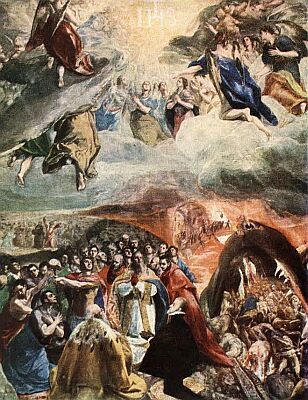
Luke 2:21 "...Et vocatum est Nomen eius IESUS"
("And His Name was called JESUS")
Psalm 90:14 "Because he hoped in me I will deliver him:
I will protect him because he hath known My Name."
Zacharias 10:12 "I will strengthen them in the Lord,
and they shall walk in His Name, saith the Lord."
Apocalypse 3:8 "I know thy works. Behold, I have given before thee a door opened, which no man can shut: because thou hast a little strength, and hast kept my word, and hast not denied My Name."
Apocalypse 15:4 "Who shall not fear Thee, O Lord, and magnify Thy Name?..."
Blessed be the most holy Name of Jesus without end!
January Devotion: The Holy Name of Jesus
The month of January is traditionally dedicated to the Holy Name of Jesus. This feast is also celebrated on January 3. Here is an explanation of the devotion.
Since the 16th century Catholic piety has associated entire months to special devotions. The devotion to the Holy Name of Jesus has been traditionally associated with the month of January, due to its celebration on January 3. The name Jesus was given to the Holy Child at God's command (Luke 1:31). The Holy Name is all-powerful because of the Person who bears it; we honor it because of the command of Christ, that we should pray in His Name and because it reminds us of all the blessings we receive through our Holy Redeemer. Hence St. Paul was able to write to the Philippians: ". . . at the name of Jesus every knee should bend of those in heaven, on earth, and under the earth" (Phil. 2:10). By means of this devotion we also make amends for improper use of the Holy Name.
Prayer Source: Prayer Book, The by Reverend John P. O'Connell, M.A., S.T.D. and Jex Martin, M.A., The Catholic Press, Inc., Chicago, Illinois, 1954
Prayer/Hymn in Honor of the Most Holy Name of Jesus - Iesu, Dulcis Memoria
Iesu, Dulcis Memoria is a celebrated 12th century hymn attributed to St. Bernard of Clairvaux (1090-1153), Doctor Mellifluus. The entire hymn has some 42 to 53 stanzas depending upon the manuscript. Parts of this hymn were used for the Feast of the Holy Name of Jesus, which was formerly celebrated on the Sunday between the Circumcision and Epiphany, or failing such a Sunday, on January 2. The part below was used at Vespers. In the liturgical revisions of Vatican II, the feast was deleted, though a votive Mass to the Holy Name of Jesus had been retained for devotional use. With the release of the revised Roman Missal in March 2002, the feast was restored as an optional memorial on January 3.
Jesus, the very thought of Thee
With sweetness fills the breast!
Yet sweeter far Thy face to see
And in Thy presence rest.
No voice can sing, no heart can frame,
Nor can the memory find,
A sweeter sound than Jesus' name,
The Savior of mankind.
O hope of every contrite heart!
0 joy of all the meek!
To those who fall, how kind Thou art!
How good to those who seek!
But what to those who find? Ah! this
Nor tongue nor pen can show
The love of Jesus, what it is,
None but His loved ones know.
Jesus! our only hope be Thou,
As Thou our prize shalt be;
In Thee be all our glory now,
And through eternity. Amen.
---Roman Breviary
Prayer Source: Prayer Book, The by Reverend John P. O'Connell, M.A., S.T.D. and Jex Martin, M.A., The Catholic Press, Inc., Chicago, Illinois, 1954
O Divine Jesus, Thou hast promised that anything we ask of the Eternal Father in Thy name shall be granted.
O Eternal Father. In the name of Jesus, for the love of Jesus, in fulfillment of this promise, and because Jesus has said it, grant us our petitions for the sake of Jesus, Thy Divine Son. Amen.
Prayer Source: Prayer Book, The by Reverend John P. O'Connell, M.A., S.T.D. and Jex Martin, M.A., The Catholic Press, Inc., Chicago, Illinois, 1954
That at the name of Jesus every knee should bend, of those that are in heaven, on earth, and under the earth, and every tongue confess that Jesus Christ is Lord, to the glory of God the Father.
Phil:2:10-11
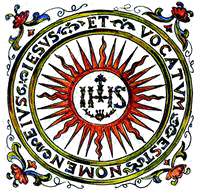
Litany Of The Holy Name of Jesus
Feast of the Holy Name of Jesus
Jesus, The Name above all Names
Devotion to the Holy Name (of Jesus) [Catholic Caucus]
Lessons In Iconography : The Chi Rho - Christ
St. Francis de Sales on the Most Holy Name of Jesus (Excerpt from a Sermon) (Catholic Caucus)
St. Francis de Sales on the Most Holy Name of Jesus (Catholic/Orthodox Caucus)
St. Bernard on the Most Holy Name of Jesus [Ecumenical]
Saving the day in His Holy Name: St. Genevieve gets a reprieve [Catholic Caucus]
The Holy Name of Jesus
Holy Name of Jesus [San Bernadino of Siena] Ecumenical
The Holy Name of Jesus
Devotion to the Holy Name [of Jesus]
The Name of Jesus: Its Power in Our Lives
The Holy Name of Jesus
Devotion to the Holy Name of Jesus
The Holy Name of Jesus
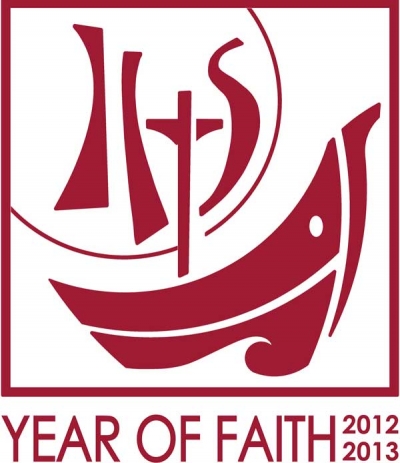
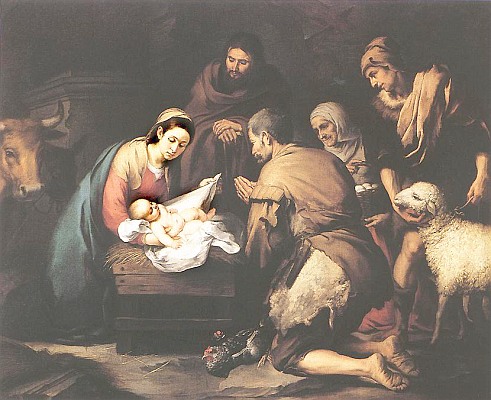
 The following is the longer version of the vital prayer composed by Pope Leo XIII in 1888 after his startling vision as to the future of the Church. This prayer was dedicated for the Feast of St. Michael 1448 years from the date of the election of the first Leo - Pope Saint Leo the Great. Everyone is familiar with the first prayer below which was mandated by His Holiness as part of the Leonine Prayers after Low Mass. Below are both the short and longer versions of this poignant prayer which should never be forgotten.
The following is the longer version of the vital prayer composed by Pope Leo XIII in 1888 after his startling vision as to the future of the Church. This prayer was dedicated for the Feast of St. Michael 1448 years from the date of the election of the first Leo - Pope Saint Leo the Great. Everyone is familiar with the first prayer below which was mandated by His Holiness as part of the Leonine Prayers after Low Mass. Below are both the short and longer versions of this poignant prayer which should never be forgotten. 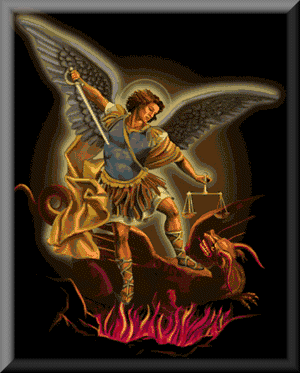
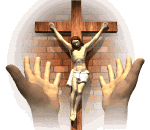 Look down upon me, O good and gentle Jesus, while before Thy face I humbly kneel, and with burning soul pray and beseech Thee to fix deep in my heart lively sentiments of faith, hope and charity, true contrition for my sins, and a firm purpose of amendment; the while I contemplate with great love and tender pity Thy five most precious wounds, pondering over them within me, calling to mind the words which David Thy prophet said of Thee, my good Jesus: "They have pierced My hands and My feet; they have numbered all My bones."
Look down upon me, O good and gentle Jesus, while before Thy face I humbly kneel, and with burning soul pray and beseech Thee to fix deep in my heart lively sentiments of faith, hope and charity, true contrition for my sins, and a firm purpose of amendment; the while I contemplate with great love and tender pity Thy five most precious wounds, pondering over them within me, calling to mind the words which David Thy prophet said of Thee, my good Jesus: "They have pierced My hands and My feet; they have numbered all My bones." 





